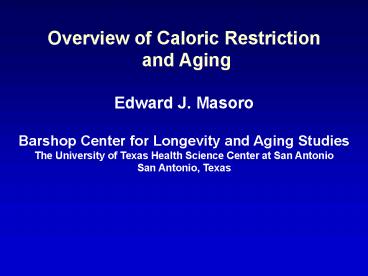Overview of Caloric Restriction - PowerPoint PPT Presentation
1 / 28
Title:
Overview of Caloric Restriction
Description:
Fat Content at 8 Months. Max. Measured Absolute Fat. Max. Measured % Body Fat. r. P. P ... Percent Loss of Body Weight During 48 Hr Following Surgical ... – PowerPoint PPT presentation
Number of Views:166
Avg rating:3.0/5.0
Title: Overview of Caloric Restriction
1
Overview of Caloric Restriction and Aging
Edward J. Masoro Barshop Center for Longevity
and Aging Studies The University of Texas Health
Science Center at San Antonio San Antonio, Texas
2
McCay et al. (1935)
RESULTS Reducing the amount of food of
rats starting at or soon after
weaning increased the length of life.
HYPOTHESIS This increase in longevity is due
to the retardation of growth.
3
LENGTH OF LIFE IN DAYS
ad libitum 60 of ad libitum intake
Median 10th Maximum
Percentile
701 822 941 1057 1226 1296
808 918 1040 941 1177 1299
Age (Months)
4
Dietary Restriction Delays the Occurrence or
Slows the Progression of Age-Associated Diseases
Examples from studies with male F344 rats
- Chronic nephropathy
- Progression slowed at death 68 of AL and 1 of
DR with severe lesions - Cardiomyopathy
- Progression slowed at death 19 of AL and 6 of
DR with severe lesions - Leukemia/Lymphoma
- Occurrence delayed at death prevalence of 23
in AL and 30 in DR
5
Mortality Rate Doubling Time (Range of values
from 4 studies on different rat strains)
Ad Libitum-Fed Rats
99-104 days
Dietary Restricted Rats
187-210 days
6
Pletcher et al., J. Geron BS, 55A386, 2000
7
Body Weight and the Length of Life of Ad
Libitum-Fed Male F344 Rats (n115)
Weight r P
Age, 2 mo. -0.14
n.s. Age, 4 mo. -0.15
n.s.
8
Correlation between Adiposity and Life Span
Bertrand et al., 1992
Ad lib (N14)
Restricted (N16)
r
P
P
r
0.12
N.S.
Fat Content at 8 Months
-0.12
N.S.
lt0.001
Max. Measured Absolute Fat
-0.04
N.S.
0.63
Max. Measured Body Fat
-0.10
N.S.
0.63
lt0.001
9
(No Transcript)
10
Life Span Caloric Expenditure
Mean Length of Life
Mean Lifetime Caloric Expenditure/ g body wt
Rat Group
A
701
91.5
B
986
133.5
11
(No Transcript)
12
A Life-long Longitudinal Study of Carbohydrate
Metabolism in Rats under Usual Daily Living
Conditions
Masoro et al., 1992
13
(No Transcript)
14
Mean 24-Hour Plasma Glucose Concentrations
(mg/dl)
Age Range (Months)
Ad Libitum Fed Rats
Food Restricted Rats
3 to 7
136 2
119 2
9 to 13
147 2
126 2
15 to 19
139 2
131 2
21 to 25
147 2
134 2
15
(No Transcript)
16
Daily Oxygen Consumption and Respiratory Quotient
of Ad Libitum Fed and Dietary Restricted 8- to
10-Month-Old, Male F344 Rats
Mean 24 h RQ
(liters)
Ad Libitum Fed
19.8 0.2
0.90 0.01
Dietary Restricted
19.3 0.4
0.89 0.01
17
Oxygen Consumption, Respiratory Quotient, and
Plasma Glucose and Insulin Concentrations
between 1600 h and 1800 h in 8- to 10-Month-Old
Ad Libitum Fed and Dietary Restricted Male F344
Rats
RQ
Plasma Concentrations
(liters)
Glucose (mg/dl)
Insulin (mg/dl)
Ad Libitum Fed
8.1 0.5
0.92 0.01
0.90 0.01
159 4
Dietary Restricted
0.94 0.02
0.93 0.02
155 3
4.4 0.3
18
(No Transcript)
19
There is evidence that Dietary Restriction
protects rodents from the harmful effects of
acute stressors.
20
Percent Loss of Body Weight During 48 Hr
Following Surgical Implantation of Jugular Canula
Loss in Body Weight
Ad Libitum Restricted
(4-5)
(21-24)
Age (Months)
21
Effect of Food Restriction on Carrageenan-Induced
Edema
Ad Lib Restricted
Foot Pad Volume
Time after Injection (hours)
Klebanov, Stavinoha, Diais, Suh Nelson
(unpublished)
22
Ability of 20-Month-Old Male F344 Rats to Survive
Heat Stress
Number of Rats
Percent Survival
92
16
Ad Libitum-Fed
36
75
Dietary Restriction
23
Hormesis Hypothesis
24
(No Transcript)
25
My Definition of Hormesis
Hormesis is the beneficial action(s) resulting
from the response of an organism to a low
intensity stressor.
26
Plasma Free Corticosterone Graph
27
Effects of Age and DR on Induction of hsp 70
Expression on Hepatocytes from Male F344 Rats
Age (mos)
Induction of hsp 70
Ad Libitum Fed
Dietary Restricted
4-6
2.15 0.38
3.05 0.27
26-28
1.17 0.33
2.38 0.32
28
Summary of the Hormesis Hypothesis
1. Evolved to enable animals in the wild to
survive unpredictable and relatively brief
periods of food shortage. 2. The antiaging
action resulting from sustained restriction
of food (DR) is a byproduct of this
evolution. 3. Two likely proximate mechanisms
of this hormesis have been identified but
much remains to be learned in this regard.































